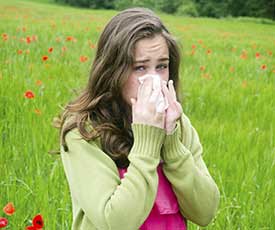Seasonal Allergies Treatment in Dade City, FL

If you're in the lucky half of the population that doesn't experience seasonal allergies, you might be wondering what we're talking about. Seasonal allergies are when plant pollination takes place, typically in the fall and spring. Many plants release pollen into the air, it's this pollen that triggers allergies for millions of Americans.
What are the symptoms of Seasonal Allergies?
Seasonal allergies can present with:
These symptoms are due to histamines, our body's allergy fighters. Histamines, cause the symptoms listed above with the goal of defending the body against what it perceives as a threat-pollen. To counteract the biological response to nature, antihistamines are recommended and used by many.
For more information on the treatment of seasonal allergies, call (813) 536-3212 or contact Dr. Christopher Van Benschoten online.
What plants cause allergies?
The list of allergy triggers is long, very long. But some of the most common allergy triggers include grasses, pollen and mold. The number one contributor to pollen induced seasonal allergies however, is the ruthless ragweed. Ragweed is typically found on the east coast and Midwest regions of the United States, with a pollinating season spanning August to November (September typically being the worst). Pair this with a max pollination range of about 400 miles and you're left with one formidable allergy-adversary.
Some other triggers can include:
- Burning Bush (a flowering plant)
- Cocklebur
- Pigweed
- Sagebrush
- Tumbleweed
- Smoke from bonfires or indoor fireplaces
- Pine Trees
- Chlorine
- Pets who have been outside (different from Pet Allergies )
- Insect bites
When exactly is allergy season?
Allergy season isn't one specific season, but rather two: spring and fall. The spring season typically spans February to June, where the fall season usually runs from August to November. This said, some conditions can intensify the impact of seasonal allergies.
A mild winter is said to bring about early plant pollination, moving the spring season forward a little. A rainy spring will likely produce more mold, a major trigger for many allergy sufferers. In addition, pollen travel is usually worst in the mornings. The worst days being warm and windy, without wind pollen can't travel. Many local news stations will even provide a pollen forecast during seasonal allergy months.
Request more information about Seasonal Allergies from a specialist today. Call (813) 536-3212 or contact Dr. Christopher Van Benschoten online.
Evolution
Address
4691 Van Dyke RoadLutz, FL 33558
(813) 536-3212
www.evolution4health.com
Hours
Mon:
10:00 am - 4:00 pm
Tue:
10:00 am - 4:00 pm
Wed:
10:00 am - 5:00 pm
Thu:
10:00 am - 6:00 pm
Fri:
10:00 am - 3:00 pm
Sat:
Closed
Sun:
Closed


